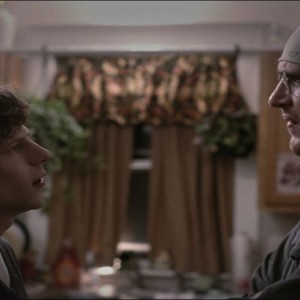I enjoyed the first hour of James Ponsoldt’s The End of the Tour, which consists mostly of two 30-something men talking to each other. As an author, interviewer and journalist I was interested in the real life premise: In 1996, staff writer David Lipsky (Jesse Eisenberg) convinces his Rolling Stone editor (Ron Livingston in a cameo) to dispatch him from Manhattan to the Midwest to cover, all expenses paid, the latest literary phenom, David Foster Wallace (Jason Segel), and his book tour promoting the tome Infinite Jest.
As in Louis Malle’s 1981 My Dinner with Andre, Tour’s pair of writers are, but of course, full of words. The repartee between the reporter and novelist is initially entertaining and engaging. Discourses on the literary life and creative process absorb me and the actors, especially Segel, do creditable jobs.
Lipsky arguably breaks journalistic standards by accepting Wallace’s hospitality and moves in with him, although there’s a motel nearby at this rural Illinois outpost. Lipsky is likely too close to his subject to remain objective, balanced and fair. He also does some pretty sneaky things behind the author’s back. For instance, in what may be another breach of journalistic ethics, the unsuccessful novelist-turned-reporter takes advantage of Wallace’s generously offering him a roof over his head by snooping in his host’s medicine cabinet to see what kind of prescription drugs Wallace is taking. (Wallace was reportedly on anti-depressants.) These possible violations of journalism’s code of ethics may indicate that Rolling Stone was reportage-challenged long before its current rape story brouhaha.
After what seems like a few days the not-so-dynamic duo fly to Minneapolis for the film’s titular tour. Joan Cusack is her quirky self as Patty, the author’s escort who shepherds the literati around town when they are in the Twin Cities’ vicinity. One of Cusack’s cracks is among the film’s best lines. Although Cusack’s role is too small it was good to see a screen depiction of minders – interesting characters working in an overlooked avocation. I once had a minder when I was on a book tour in Hawaii who was such a malihini (newcomer) that she had no idea how to get around the islands, so I had to give her directions everywhere we went to sign books.
Anyway, after Wallace’s tour is over he and Lipsky return to the middle of nowhere in Illinois. It’s downhill from here, devolving into a blabfest that does not really capture one’s attention. Their male egos begin to clash – Lipsky, who has published a minor novel, is envious of Wallace’s fame and success after his Infinite Jest hits the bestseller list. They compete over women, and so on.
Nothing much really happens – no wonder Rolling Stone decided not to publish an article based on Lipsky’s dull misadventures in the Midwest after spending a wad of Jann Wenner’s loot. (Lipsky ain’t exactly a Hunter S. Thompson – or Matt Taibbi, for that matter.) The magazine was clearly exercising better journalistic judgment in the 1990s than it has in more recent times, caught up in scandals and lawsuits as it is now over allegedly bogus reporting about gang rape on a college campus.
Lipsky did, however, keep his extensive audiotapes, which he turned into a 2010 book after Wallace’s demise at the age of only 46. Did Lipsky cash in on Wallace and attain a measure of the fame and fortune he envied the Infinite Jest author for having? Although given Wallace’s ending, recognition and money don’t necessarily the happy one maketh and aren’t all they’re cracked up to be.
Eisenberg is pretentiously cerebral as he also was playing the social retard who could only relate to humans virtually so he supposedly invented Facebook in 2010’s The Social Network. I’ve never been a fan of Segel’s buffoonish sexual loser shtick in flicks like 2012’s This is Forty and 2008’s Forgetting Sarah Marshall (which at least had the virtue of being shot in Hawaii). Seriously, has anyone ever seen Segel in a room with Seth Rogen at the same time? Having said that, in Tour Segel probably delivers his best performance to date and he is a dead ringer for the misbegotten Wallace at a certain period of his all too short life.
The film could have used more of the idiosyncratic Cusack to jazz it up. Ponsoldt’s 2013 coming of age drama The Spectacular Now was better than this snoozefest that screenwriter Donald Margulies based on Lipsky’s tell-all. Really, whose idea was it to film a blabfest about a guy purportedly on anti-depressants? This movie barely moved, feeling more infinite than jest. Although the first sixty minutes or so of The End of the Tour was good, after 106 minutes, when the curtain fell, I felt as if it was the end of the snore.


Leave a Reply